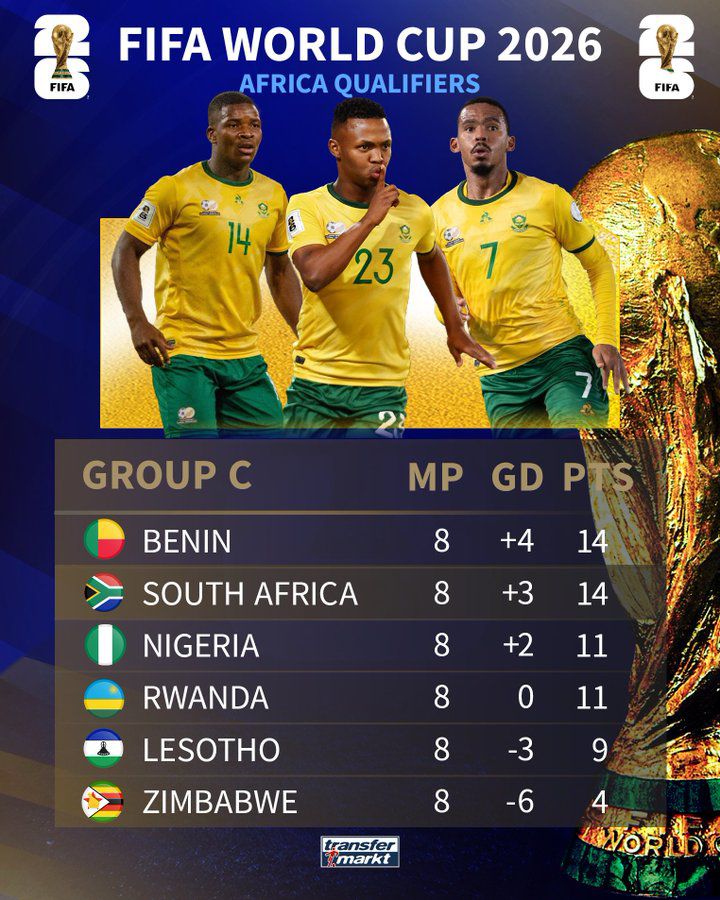In a dramatic twist that has set the football world buzzing, FIFA has finally stepped in and docked South Africa three crucial points for fielding an ineligible player during their World Cup qualifying campaign. The decision, which many had been clamoring for over the past few weeks, has now blown Group C wide open and given Nigeria’s Super Eagles a new lifeline in their pursuit of a ticket to the 2026 FIFA World Cup.
For weeks, Nigerian fans, analysts, and even former players had been calling on FIFA to take action after reports emerged that South Africa had featured midfielder Teboho Mokoena in a qualifier against Lesotho despite the player being suspended for two yellow cards. The issue had sparked heated debates across Africa, with many accusing FIFA of turning a blind eye. Now, after a thorough review, the world football governing body has finally delivered justice.
According to the FIFA Disciplinary Committee’s ruling released early Monday morning, South Africa were found guilty of breaching Article 55 of the FIFA Disciplinary Code, which strictly prohibits the fielding of suspended players. Consequently, the match in question, a 2–1 victory for Bafana Bafana, has now been overturned and awarded as a 3–0 win to Lesotho. The three points deduction now sees South Africa’s total reduced, leaving them level with Benin on 14 points and placing Nigeria just within striking distance.
For Nigerian supporters, this is the moment they had been waiting for. In recent weeks, faith in the Super Eagles’ qualification campaign had wavered after a string of underwhelming results. Many fans had resigned themselves to disappointment, believing the team’s fate was sealed. But now, with South Africa’s punishment reshaping the table, hope has returned to the hearts of millions.

Many say it’s justice served, as the delay in response from Football’s ultimate body had many fans and observers alike questioning if South Africa were going to get away with it. However, FIFA’s decision proves that no one is above the laws of the game. Nigeria now has a fighting chance, and it’s up to the players to take it.
The ruling has been met with a mix of shock and frustration in South Africa. The South African Football Association (SAFA) has expressed disappointment at the decision and is reportedly considering an appeal within 10 days as stipulated in FIFA’s rulebook. However, legal experts say overturning such a ruling is highly unlikely given FIFA’s strict stance on eligibility violations.
In Nigeria, the mood is entirely different. From the streets of Lagos to Port Harcourt and Abuja, excitement is palpable. The development not only restores belief among fans but also changes the dynamics of the group. With South Africa losing three points and Nigeria only a few points adrift, the next round of fixtures has become decisive. A victory in Nigeria’s next game could catapult the Super Eagles into serious contention, especially if results elsewhere go in their favor.
Football analysts have been quick to point out that while this decision breathes life into Nigeria’s campaign, qualification is still not guaranteed. The Super Eagles must now capitalize on this second chance, win their remaining matches convincingly, and avoid any slip-ups that could undo the advantage they’ve gained.
For FIFA, the decision reinforces its commitment to fairness and accountability in global football. The governing body has faced mounting pressure in recent years to clamp down on administrative negligence and uphold the integrity of the sport. By acting decisively, FIFA has sent a clear message: rules apply to all, regardless of reputation or standing.
As the dust settles, one thing is certain. The race for qualification in Group C is far from over. The Super Eagles, who once looked destined to miss out, are now back in the mix. Their destiny, once clouded in uncertainty, has taken on new clarity.
For a nation as passionate about football as Nigeria, this ruling feels like divine timing. It offers redemption, a second chance, and a renewed sense of purpose. The journey to the World Cup remains a difficult one, but for the first time in months, the dream feels attainable.
Nigeria’s World Cup dream is alive again. And this time, they have FIFA’s intervention to thank.
Samuel Aina

